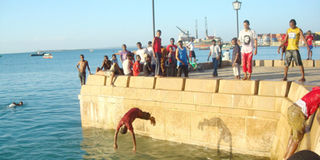History of ‘Makachu’ unfolds as Forodhani's diving stunt returns

What you need to know:
- The authority had halted the activity due to multiple violations, including damage to drainage systems, misuse of waste bins, and culturally inappropriate attire.
Dar es Salaam. Makachu, a traditional diving stunt popular in Forodhani, Stone Town, Zanzibar, officially resumes today, January 1, after being suspended by the Stone Town Conservation and Development Authority.
The authority had halted the activity due to multiple violations, including damage to drainage systems, misuse of waste bins, and culturally inappropriate attire.
The Authority’s Director General, Mr Ali Abubakar, said in a December 22 announcement that only performers who agreed to adhere to new guidelines would be allowed to participate.
"We are formalising Makachu to protect our culture, infrastructure, and public safety. Those who comply will be given contracts, while violators will face permanent bans," he explained.
Makachu’s roots lie in a coastal tradition where individuals would dive into the ocean.
Originally referred to as ‘Kachumbe,’ over time the name evolved to ‘Kachu,’ and eventually to ‘Makachu’ as the activity gained popularity.
According to one of the prominent Makachu divers, Ameir Rashid Rashid, also known as Devian Smart or ‘Mkaka wa Forodhani,’ the tradition was initially a recreational activity among Zanzibar youths but has since grown into a unique form of entertainment and a source of livelihood.
“Back in the day, we used to tell each other, ‘Let’s go dive into the sea and do Kachu,’ but now it’s bigger than that.
“It’s not just about entertainment anymore. It’s about culture, tourism, and income for many of us,” Rashid said.
However, the modern Makachu era began in 2022 when performers started incorporating banners bearing names of celebrities and clients into their stunts.
Forodhani’s Makachu Group discipline leader, Omary Bakari Khalfani, also known as Ommy Makachu, said this shift was driven by a desire to promote Zanzibar’s tourism.
"We wanted to turn Makachu into something more impactful. By diving with banners, we could attract attention and invite people to visit Zanzibar," he said.
Makachu has since become a lucrative activity, with some performers earning over Sh20 million annually.
However, its rapid growth has not been without challenges. Concerns over safety and cultural sensitivity led to its temporary ban.
Khalfani clarified that, contrary to rumours, no deaths have occurred due to Makachu.
"Yes, we’ve had injuries, like one of our colleagues who was paralysed, but nobody has died. Safety is now our top priority. We’ve introduced life jackets and trained members to respond quickly in emergencies," he said.
The new guidelines also include inclusivity measures, allowing women to participate for the first time.
"Initially, we restricted women due to cultural concerns, but now things are changing. We’re excited to welcome everyone who meets the requirements," Khalfani added.
Social media has played a significant role in Makachu’s popularity, with pioneers like Yess Jamal sharing videos of their stunts online.
Jamal, now one of the most-followed individuals from Zanzibar after Zuchu, was instrumental in introducing the activity to a global audience.
Rashid also denied social media rumours suggesting that the performers had relocated to the Coco Beach in Dar es Salaam.
"Those videos were taken out of context," he said.
He added: "Months back, we were hired for a temporary project in Dar, and the remarks about not returning to Zanzibar were just jokes. We’ve always been committed to Zanzibar."
Makachu performances will now follow a strict schedule, running from 7am to 10pm during peak tourist seasons.
With its return, many hope it will once again boost Zanzibar’s tourism and provide economic opportunities for local youths.
“We’re excited to be back and to do what we love. Makachu is more than a stunt—it’s part of our identity,” Khalfani said.





